Unpacking RFK Jr.’s Controversial Claims on Chronic Disease and Government Oversight
Robert F. Kennedy Jr. (RFK Jr.) has emerged as a prominent voice in the ongoing discourse about public health, particularly regarding chronic diseases and the role of government oversight. His claims suggest that the government has turned a blind eye to the chronic disease crisis, leaving millions of individuals without necessary support and resources. However, experts in the field argue that his views may oversimplify a complex issue. This article delves into the multifaceted nature of chronic illness management, explores the nuances of public health policy, and examines the implications of RFK Jr.’s assertions.
The Landscape of Chronic Disease in America
The statistics surrounding chronic diseases in the United States are staggering. According to the Centers for Disease Control and Prevention (CDC), approximately 60% of adults live with at least one chronic condition, and 40% have two or more. These conditions range from diabetes and heart disease to mental health disorders and autoimmune diseases. The prevalence of chronic illnesses has significant implications for individuals and the healthcare system as a whole.
Chronic diseases often require long-term management, including medication, lifestyle changes, and ongoing medical care. The financial burden on patients can be overwhelming, with costs associated with treatment, medications, and lost productivity. Moreover, the emotional toll on individuals and families grappling with chronic illness is profound, leading to increased levels of stress, anxiety, and social isolation.
RFK Jr.’s Perspective on Government Oversight
RFK Jr. has been vocal about what he perceives as a failure on the part of the government to adequately address the chronic disease crisis. He posits that regulatory agencies, such as the Food and Drug Administration (FDA) and the Centers for Disease Control and Prevention (CDC), prioritize pharmaceutical profits over patient well-being. His claims suggest that there is a lack of transparency and accountability in how these agencies operate, leading to a public health crisis that disproportionately affects vulnerable populations.
One of the central tenets of RFK Jr.’s argument is the assertion that the government’s approach to health care is reactive rather than proactive. He contends that instead of focusing on prevention and holistic health strategies, public health policies often emphasize treatment after the onset of disease. This perspective resonates with many who feel that the healthcare system fails to address the root causes of chronic illnesses, such as environmental toxins, lifestyle choices, and socioeconomic disparities.
The Complexity of Chronic Disease Management
While RFK Jr.’s claims shed light on critical issues within public health policy, experts caution against oversimplification. Chronic disease management is a complex field influenced by a myriad of factors, including genetics, environment, lifestyle, and access to healthcare services. The interplay of these elements makes it challenging to pinpoint a singular cause or solution to the chronic disease crisis.
- Genetics: Many chronic diseases have a genetic component, meaning that individuals with a family history of conditions such as diabetes or heart disease may be at a higher risk.
- Environment: Exposure to pollutants and toxins can contribute to the development of chronic diseases. However, the relationship is multifactorial and often intertwined with socioeconomic factors.
- Lifestyle Choices: Diet, exercise, and smoking are significant contributors to chronic disease. Public health initiatives that promote healthier lifestyles play a crucial role in prevention.
- Access to Care: Disparities in healthcare access can exacerbate chronic disease outcomes. Socioeconomic status often determines the quality of care individuals receive, impacting their ability to manage chronic conditions effectively.
Public Health Policy and Its Limitations
The complexity of chronic disease management is mirrored in public health policy. While there are numerous initiatives aimed at reducing the prevalence and impact of chronic diseases, systematic barriers often hinder their effectiveness. Funding limitations, bureaucratic red tape, and conflicting interests can stymie efforts to promote comprehensive care and prevention strategies.
Moreover, the COVID-19 pandemic has further complicated the landscape. The focus on infectious diseases has diverted attention, funding, and resources away from chronic disease management. Many patients with chronic conditions faced disruptions in their care, leading to worsened health outcomes. This shift has sparked conversations about the need for a more integrated approach to health care—one that encompasses both acute and chronic conditions.
Examining Alternatives to the Current System
As the debate surrounding chronic disease and government oversight continues, various stakeholders are advocating for alternative approaches. These include:
- Holistic Health Models: Integrative medicine, which combines conventional and alternative therapies, is gaining traction as a way to address chronic diseases more effectively.
- Preventive Care Initiatives: Programs that focus on prevention, such as community health screenings and education, have the potential to mitigate the onset of chronic diseases.
- Patient Advocacy: Empowering patients through education and advocacy can lead to better self-management of chronic conditions, reducing reliance on the healthcare system.
Conclusion: A Call for Dialogue
RFK Jr.’s accusations regarding government neglect in the face of a chronic disease crisis invite critical dialogue about public health policy and its efficacy. While his claims resonate with many who feel left behind by the healthcare system, it is vital to approach the conversation with an understanding of the complexities involved in chronic disease management.
Ultimately, addressing chronic diseases requires a collaborative effort among government agencies, healthcare providers, patients, and communities. By fostering open dialogue and exploring multifaceted solutions, stakeholders can work together to create a more effective healthcare system that prioritizes prevention, accessibility, and holistic care.
As we continue to navigate the challenges posed by chronic diseases, it is essential to remain informed, engaged, and proactive. The future of public health depends on our ability to address these issues comprehensively and compassionately.
See more WebMD Network



